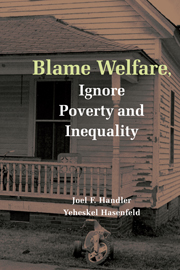Book contents
- Frontmatter
- Contents
- Acknowledgments
- List of Acronyms
- 1 Introduction
- 2 The State of Poverty: TANF Recipients
- 3 The Response to Poverty and Inequality: The Welfare State
- 4 Demonizing the Single-Mother Family: The Path to Welfare Reform
- 5 The Welfare Bureaucracy
- 6 Work and the Low-Wage Labor Market: Mothers and Children
- 7 Welfare Reform and Moral Entrepreneurship: Promoting Marriage and Responsible Parenthood and Preventing Teenage Pregnancy
- 8 Addressing Poverty and Inequality
- References
- Author Index
- Subject Index
1 - Introduction
Published online by Cambridge University Press: 20 August 2009
- Frontmatter
- Contents
- Acknowledgments
- List of Acronyms
- 1 Introduction
- 2 The State of Poverty: TANF Recipients
- 3 The Response to Poverty and Inequality: The Welfare State
- 4 Demonizing the Single-Mother Family: The Path to Welfare Reform
- 5 The Welfare Bureaucracy
- 6 Work and the Low-Wage Labor Market: Mothers and Children
- 7 Welfare Reform and Moral Entrepreneurship: Promoting Marriage and Responsible Parenthood and Preventing Teenage Pregnancy
- 8 Addressing Poverty and Inequality
- References
- Author Index
- Subject Index
Summary
In 1996, Congress passed and President Clinton signed the Personal Responsibility and Work Opportunity Reconciliation Act (PRWORA). The president claimed, “We have ended welfare as we know it.” The centerpiece of the new legislation was Temporary Assistance for Needy Families (TANF), which replaced Aid to Families with Dependent Children (AFDC), commonly referred to as “welfare,” the existing cash assistance program for single mothers and their children. Among other things, welfare would no longer be an entitlement: stiff, new work requirements were to be imposed on the mothers, and the work requirements were to be enforced by time limits – states must require recipients to work after a maximum of 24 month on aid or less, and there is a cumulative lifetime limit of five years on receipt of aid. Various “family values” provisions were specified, such as marriage promotion, child-support enforcement, and programs to combat teen pregnancy. State control was increased substantially. Before the 1996 reform, welfare rolls had been declining sharply, and this decline increased substantially in subsequent years. It seemed as if President Clinton's statement was true. Welfare as we know it had finally been ended. Everyone claimed “victory.” “Welfare” has dropped out of the political discourse and is virtually forgotten. Unfortunately, discussion of poverty and inequality has nearly disappeared as well – even though significant poverty remains, especially child poverty, and inequality has been increasing over the past few decades.
From colonial times, cash assistance for the able-bodied was always miserly, conditioned, and brief.
Information
- Type
- Chapter
- Information
- Blame Welfare, Ignore Poverty and Inequality , pp. 1 - 16Publisher: Cambridge University PressPrint publication year: 2006
